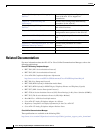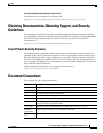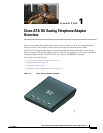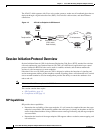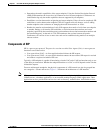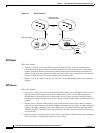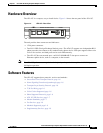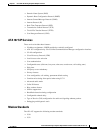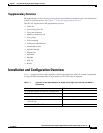
1-2
Cisco ATA 187 Analog Telephone Adaptor Administration Guide for SIP (Version 1.0)
OL-21862-01
Chapter 1 Cisco ATA 187 Analog Telephone Adaptor Overview
Session Initiation Protocol Overview
The ATA187, which operates with Cisco voice-packet gateways, makes use of broadband pipes that are
deployed through a digital subscriber line (DSL), fixed wireless-cable modem, and other Ethernet
connections.
Figure 1-2 ATA 187 as Endpoint in SIP Network
Session Initiation Protocol Overview
Session Initiation Protocol (SIP) is the Internet Engineering Task Force (IETF) standard for real-time
calls and conferencing over Internet Protocol (IP). SIP is an ASCII-based, application-layer control
protocol (defined in RFC3261) that can be used to establish, maintain, and terminate multimedia
sessions or calls between two or more endpoints.
Like other Voice over IP (VoIP) protocols, SIP is designed to address the functions of signaling and
session management within a packet telephony network. Signaling allows call information to be carried
across network boundaries. Session management provides the ability to control the attributes of an
end-to-end call.
Note SIP for the ATA 187 is compliant with RFC2543.
This section contains these topics:
• SIP Capabilities, page 1-2
• Components of SIP, page 1-3
SIP Capabilities
SIP provides these capabilities:
• Determines the availability of the target endpoint. If a call cannot be completed because the target
endpoint is unavailable, SIP determines whether the called party is already on the phone or did not
answer in the allotted number of rings. SIP then returns a message indicating why the target endpoint
was unavailable.
• Determines the location of the target endpoint. SIP supports address resolution, name mapping, and
call redirection.
V
Cisco ATA 187
Telephone/fax
Ethernet
Broadband CPE
(DSL, cable,
fixed wireless)
Broadband
SIP proxy
Layer 3
IP infrastructure
PSTN
Voice
gateway
197596
V







